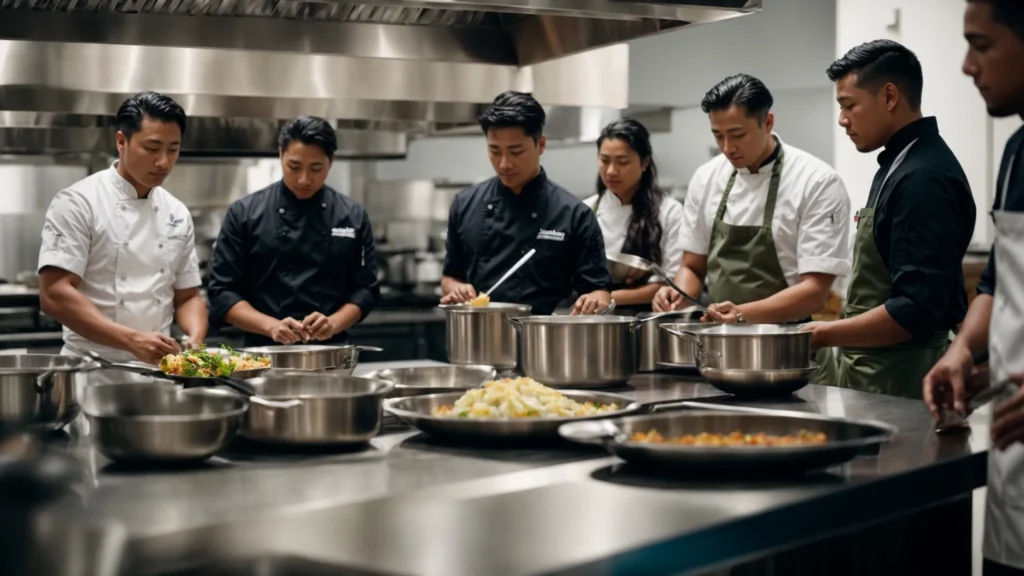Key Benefits of Attending Culinary School
Embarking on a career in the culinary arts is an exciting journey, filled with flavor, creativity, and passion. Culinary school offers a structured environment where aspiring chefs can hone their skills and learn from industry professionals. From mastering basic knife techniques to creating gastronomic masterpieces, the experience gained in these institutions is unparalleled. Those looking to elevate their culinary expertise to a professional level will find attending a culinary school immensely beneficial. Keep reading to discover how this educational path can shape the future of any budding chef.
Exploring the Professional Skills Acquired in Culinary School
In the bustling world of culinary arts, having a solid foundation of cooking techniques is paramount. Culinary school provides an opportunity for students to learn these techniques from experienced chefs. Students immerse themselves in a variety of cooking styles, learn about flavor pairings, and understand the nuances of global cuisines. This formal education ensures that graduates enter the workforce with a comprehensive skill set.
Moreover, culinary programs often include lessons in menu planning, food safety, and kitchen management. These additional skills are critical for any chef who aims to run a successful kitchen or own a restaurant. By emphasizing both culinary prowess and management acumen, students are prepared for the multitude of challenges they will encounter in their careers.
Professionalism and work ethic are also central themes in the curriculum of many culinary schools. Attendance, punctuality, and a respect for the high standards of the industry are instilled from day one. These attributes are as valuable as technical skills when it comes time for employment, as they are traits that potential employers highly seek out.
Access to State-of-the-Art Kitchen Facilities and Equipment
One of the most tangible advantages of enrolling in a culinary school is access to professional-grade kitchens and modern culinary tools. These facilities are designed to simulate real-world kitchen environments, complete with the pressures and demands of the culinary industry. Students learn to adapt and thrive using equipment that they will encounter in high-end restaurants and hotels.
Furthermore, by working in these kitchen labs, students gain familiarity with industry standards of health and safety. The importance of keeping a clean and organized kitchen, managing inventory, and adhering to food safety regulations is instilled through hands-on experience. This experience proves invaluable when transitioning into a professional culinary setting where these protocols are law.
The exposure to a wide array of equipment allows students to learn specialized techniques, such as sous vide cooking or molecular gastronomy. This technical knowledge can set them apart in an employment pool, where expertise in advanced culinary technologies is increasingly sought after.
Gaining a Competitive Edge in the Culinary Job Market
A diploma from a respected culinary school can be a significant differentiator in the competitive culinary job market. Recruiters and restaurant owners recognize the rigorous training and comprehensive education that come with such an accomplishment. Graduates often find their credentials open doors that might be harder to access without formal education.
Beyond the diploma, the hands-on experience gained through internships and practical classes makes culinary school graduates highly attractive to employers. They have proven they can apply their knowledge in real-world scenarios, which reduces on-the-job training time and costs for employers.
The job market for chefs and culinary professionals is evolving with an increasing demand for specialization. A culinary school education helps meet this demand by offering courses focused on particular niches, such as pastry arts, nutrition, and food styling. This specialization creates experts in fields within the culinary industry, making graduates even more appealing to prospective employers.
The Role of Culinary Schools in Fostering Creativity and Innovation
The culinary world thrives on innovation and creative expression, and culinary schools are fertile grounds for nurturing these qualities. In an environment dedicated to the culinary arts, students are encouraged to experiment with flavors, textures, and presentation. This freedom fosters a spirit of innovation that graduates carry with them into professional kitchens.
Teachers and mentors in culinary schools are often chefs who have pushed the boundaries of traditional cooking themselves. With their guidance, students learn how to think outside the box and develop their unique culinary style. The constant exposure to a variety of cooking styles and ingredients catalyzes fresh ideas and avant-garde dishes.
Overall, the benefits of attending a culinary school extend far beyond acquiring cooking skills. It provides a holistic preparation for a successful career in the culinary industry, nurturing practical skills, building crucial networks, and fostering innovation. Graduates leave with not only a set of professional tools but also with a mindset geared toward growth, creativity, and contribution to the vibrant world of food and gastronomy.
